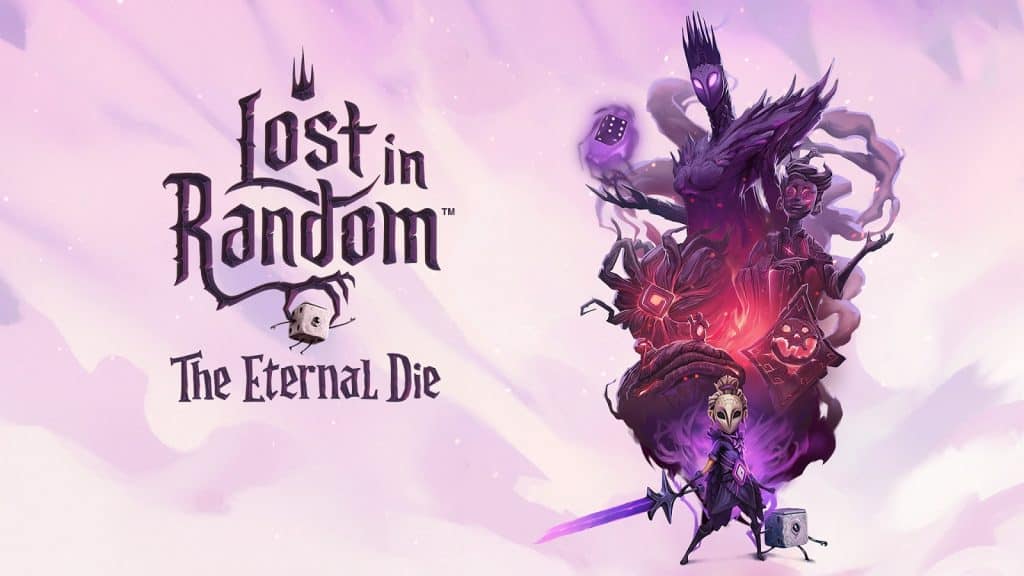Grief and loss are powerful motivators, so much so that it nearly drove Aleksandra to run her Kingdom of Random to the brink of ruin. But after losing it all in Lost in Random, the former queen is now solely focused on getting revenge on all those who had deceived her all this time, including the Black Die from whom she drew so much power from.
Lost in Random: The Eternal Die is an action roguelite set within the confines of the Black Die. Players take control of Aleksandra, the villain of the first game. While not exactly a direct sequel to the first game, this bite-sized spin-off ties together the events before and after Aleksandra’s tragic accident, answering many lingering questions in the process.
When we last saw Queen Aleksandra of Random, she had finally accepted her sister’s death and vowed vengeance on The Three Heads, the ones who promised to save her sister, Natalya, from her fate. In the time since then and the start of the Eternal Die, Aleksandra has somehow managed to vanquish the Three Heads. She now sets her sight on destroying the Black Die, the source of so much despair.
The game begins with Aleks squaring up against the Black Die. Suddenly, a portal opens up and she is transported into the die itself. When she wakes up, Aleks is surprised to have been reverted back to a child-like form. She doesn’t dwell on it, however. Revenge is the only thing in her mind. She also learns that the entity called Mare the Knight has been pulling the strings from the very beginning. Now, he wants Aleks to play his “games”, to suffer an endless cycle of death and rebirth. Basically, the setup of every rougelite game to date.
At the start of every cycle, Aleksandra and her dice Fortune are literally dumped to a place the denizens refer to as Sanctuary. Most see it a port in the storm, a place of relative safety amongst the chaos that is the Black Die. In reality, it is a place of false hope created to maximize the suffering of the cube’s victims.
Sanctuary is the hub world where you interact with NPCs who will offer you their aid in your quest. Chance is your primary guide throughout. He is the one who gives you the lay of the land and probably the only one who still believes that escape is still possible. There’s also Rack the weapons keeper. He stores and upgrades all weapons in your arsenal. Aama the witch will upgrade your abilities in exchange for pip dust you find during your runs. And finally, we have the Rug Dealer. She makes the costumes out of the material you bring back. There are other characters lost in Mare’s twisted games, but they don’t offer much other than the odd reward for completing their quests.
The first thing you do at the start of every run is to choose your weapon. You start the game with versatile Sword of Sixtopia. But eventually, you will earn enough to unlock the specialist weapons: the Sevendipidy Striker, Lance of Lady Luck, Helleven’s Hammer. Each weapon has a specific fighting style that greatly changes your fighting style during every run.
The Sword of Sixtopia is the most balanced in terms of speed, reach, and attack power. The Sevendipidy Striker allows you to attack from long range but leaves you vulnerable up close. The Lance of Lady Luck’s relentless attack make it a menace at mid-range but you have to maintain a set distance for max effectiveness. Helleven’s Hammer is a powerhouse, but your wind-up attacks leave you briefly open to enemy counterattack.
I absolutely love experimenting with different move sets for each weapon. Every weapon has four unique tracks you can upgrade, each offering noticeable change ups to the weapon’s usual playstyle. One move set might benefit from constant charge attacks while others prioritize spamming normal attacks. It’s a simple yet addictive system that I can’t get enough of.
Once inside the game board, you have the option to pick an ability card for extra firepower. The card is randomized each time, so lady luck will decide if you’ll have a well-rounded offensive for that run. I think the reason why you don’t have much choice is the fact that there are only around a dozen cards to choose from. Kind of disappointing but you quickly learn to play around that limitation once you have your sights set on getting the perfect build for your current. That will involve having the right relics.
While the game failed at ability choice, it makes up for it by having a wide selection of Relics to choose from. Relics add that spice the game needs to sustain a decent run. You get them after clearing rooms or buying them from Mannie Chex, great, great, great grandma to renowned card seller, Mannie Dex. You can also get them as prizes from “games of chance” rooms. Each relic has an associated colored dye with them. Creating a line of three on the grid with the corresponding color will either increase weapon power, card damage, dice damage, or elemental damage. This is pretty much the primary reason to keep playing the game long after you’ve deciphered all the game’s secrets. There is so much joy in stacks effects. It was definitely a lot more than I initially expected.
At the end of each run, you return back to Sanctuary to spend all the pip dust and cinder you have earned for that specific run. Again, it is a simple loop but an effective one.
There are four stages to conquer in each run. The Duplets are the entree that decides the direction of your build. Eema’s stage introduces tougher enemies. This is where you start shaping out your grid. By the time you reach the Formageddon’s realm, you should have everything you need for Mare’s domain (aka the final stage).
This is the part where things get complicated. Objectively speaking, the game’s pretty short. A good run will go for less than a couple of hours. A very good run can run up to 45 minutes. I feel like this game is best enjoyed in short bursts. It has no other long-term goals other than clearing the conditions for the true ending. That will involve finding all 35 dicelings on multiple runs and completing costume sets for a couple of character quests. Finding all of the Visionary’s lost memories is also part of it. But for his part, the Visionary is key to the broader story as a whole.
After all that’s said and done, you are left with the game’s one end-game activity: the Sigils of Misfortune. It’s basically the same loop but with a growing set of handicaps. Completing the trials with the maximum number of handicaps will net you the Mare the Knight costume set, exclusively for bragging rights.
The most fun I’ve had with the game involves experimenting on the fly. You don’t have much flexibility throughout your runs so it pays to committing to either a dice build or a weapons build. By that I mean prioritizing throwing Fortune for a chance at burst damage, plus benefits, or consistent weapon damage. Either way, the best runs I’ve had often shoe horning relics that have no place in a well-planned grid. On a personal note, multicast is GOATED in this game. If you ever get the chance to go for a multicast build, do it. You’re practically setting yourself up for a clean and hassle-free run.
In terms of visuals, it’s a step down from the charmingly weird artstyle of the first game. Though I can’t fault it that much considering this game is more of a stopgap for a potential true sequel. Additionally, I’ve not run into any performance issues whatsoever, not even a stutter in frame rate. The BGM for the game gets the job done as you’ll hear faint reminders of instruments playing for emphasis over the mostly ok soundtrack. It’s passable for a lack of a better term.
Lost in Random: The Eternal Die might not have the staying power of a main line game, but it nevertheless is a critical piece that ties the whole story together with a neat little bow. With any luck, we may get that sequel being teased at the end of that true ending. Until then, I will remain content on completing that Mare the Knight costume set as I gleefully turn the tormenter into the tormented. If you love Lost in Random and its lore, you have good reason to check this game out. Otherwise, I recommend this game to players who love fast-paced roguelites.
Lost in Random The Eternal Die Review
Lost in Random: The Eternal Die might not have the staying power of a main line game, but it nevertheless is a critical piece that ties the whole story together with a neat little bow.
The Good
- Fast-paced action
- Expands upon the story and world set in the first game
- Highly focused on the gameplay loop
The Bad
- Lacks enemy variety
- Short and sometimes bittersweet
- Limited choices










